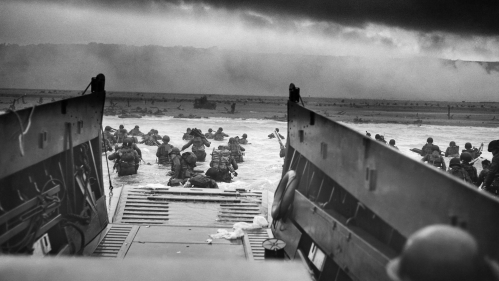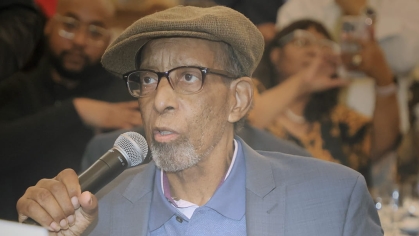From VE Day to D-Day: Remembering Rutgers Alumni Who Served

The Rutgers Oral History Archives keeps alive stories of Rutgers alumni and other World War II veterans, including those who stormed the beaches of Normandy in 1944 on D-Day, a key date on the road to Victory in Europe Day (VE Day), which celebrated its 80th anniversary on May 8.
Ernest A. Hilberg was a 19-year-old U.S. Army infantryman in a landing craft approaching hellish combat on Omaha Beach during the D-Day invasion when artillery fire blew a hole in the boat’s bottom. He jumped in the water, confident at 6-foot, 4-inches tall he would be able to stand in the waves.
“Hey, I've got news for you—the water is more than six-feet-four,” Hilberg ENG’49 said in an interview with the Rutgers Oral History Archives in 2007 when he was 83. “The depth is around seven feet.”
He plunged beneath the surface and worried about drowning, but he was able to jump up from the bottom to get his head above the waves to breathe while moving toward the battle on the beach. “The trick was to bounce up and forward at the same time,” Hilberg said.
Hilberg was part of the successful invasion of the Normandy beaches in northern France by Allied troops from the U.S., Canada, the United Kingdom, and other countries, which led to France’s liberation from Nazi Germany. It is often referred to as the beginning of the end of World War II.
Despite the invasion’s successful result, it came at a high cost to Allied troops. More than 4,000 died, including one man who was next to Hilberg.
As Hilberg was making his way into the shore, a soldier in the water next to him cried for help. “I grabbed his arm and pulled him along with me,” Hilberg said. “Eventually, we got where we could walk. Simultaneously at that point, he gets a bullet right in the head.”
Hilberg would return to New Jersey and go on to earn an engineering degree from Rutgers in 1949. He died in 2009, two years after completing his interview with the Rutgers Oral History Archives.
His story is just one of many that the archives have preserved in its vast collection.
During World War II, two Rutgers women and 234 Rutgers men died in service, and nearly one-third of all living Rutgers alumni at the time served.
“Although most of the Rutgers alumni who served in World War II are gone, our archive has preserved many of the stories of these brave men and women,” says Shaun Illingworth, director of the Rutgers Oral History Archives. “Our efforts to save these important stories exist thanks to the numerous loyal alumni who have supported the archives over the years.”
To learn more about Rutgers and the war, watch the video “World War II Brings Sweeping Change to Rutgers,” which includes interviews form the archives.
For more from the Rutgers Oral History Archives, visit “Remembering the Greatest Generation on the 70th Anniversary of D-Day” and “Thank You, God, For V-E Day,” An Exhibit on the 80th Anniversary of the End of the WWII in Europe.
Preserve History
Consider donating to the Rutgers Oral History Archives Gift Fund.


